
High-purity water can be produced either by ion-exchange or through electrodeionisation (EDI), which can be regarded as an electrically regenerated ion-exchange process.
Electrodeionisation technology is superior to ion-exchange in many aspects, including no requirement for chemicals, its environmental friendliness, and easy operation. However, it usually needs the assistance of a selective ion-exchange membrane, which leads to problems such as high cost, difficulty in repairing, and membrane fouling.
Researchers at Zhejiang University in China have proposed and tested a new process, called membrane-free electrodeionisation (MFEDI), for high-purity water production.
MFEDI was operated in a batch countercurrent mode, alternating with a long service step and a short regeneration step. A total of 20 operational cycles were examined.
The effluent conductivity was only 0.056–0.059 μS/cm. The Na+ and Ca2+ concentrations, conductivity, and pH value of the concentrate, as well as the voltage required, were examined systematically during regeneration. The concentrate conductivity varied from 217 μS/cm to 150 μS/cm, the average pH value of the concentrate was 7.9, and the average voltage was 730 V.
Effective regeneration was achieved, and the resins retained their good deionisation efficiency even after repeated regeneration.




